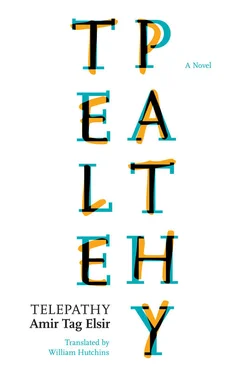Toward the end of the book, on a normal day without any delirium, Nishan experienced a strange weakness. He felt that his intestines were contracting, that his body was burning hot, that his head was spinning, and that his chest had become a battleground where pains struggled for supremacy. He staggered, without anyone’s assistance, to the government hospital. There he was methodically examined, and it was discovered that he had incurable glandular cancer.
The novel was filled with many characters, including a high-society lady who always put on airs; a miserable soldier who attempted to overthrow the government without knowing how and who was executed by a firing squad; a truck driver who was a member of Nishan’s family and who was charged with supervising him during his episodes of delirium; and a nurse named Yaqutah, whom Nishan met and fell in love with when she worked in the psychiatric hospital. She tried to help him during his ordeal. Nishan Hamza, however, was the puppeteer who held the strings for all the other characters.
Actually, in almost all the works I have written, I have devised strange names for my characters, names that are not frequently used in this country, or names that are used disparagingly and in certain tribes. This has not been true for all my characters, of course, but just for those who play major roles or those I want to stick in the minds of readers. I never use three-part names; I don’t know why I used the tripartite name Nishan Hamza Nishan in this novel. I noticed this fact during my feverish writing, but its rhythm prevented me from deleting it. I sensed then that I wouldn’t like it if it consisted of only two names.
I knew no one named Nishan and have never encountered anyone with that name in my readings or frequent travels around the country or abroad. I mused over it when I first wrote it, surprised and wondering where it had come from, but have never reached a definite answer. Doubtless it was a known name and was certainly used in some Arab or African countries — just not in mine.
I remember the book’s launch party was held just two days before I traveled, in a simple hall normally used for wedding parties. The event drew readers and people interested in culture. A beautiful girl asked me in a captivating voice with attractive circumspection: “Sir, how do you select names when you write? I find that the name Nishan Hamza Nishan is a perfect fit for the hero’s character and behavior. If he were a real man, this would be his name.”
I didn’t have a logical answer for her question and had no coherent theory about names or precise strategy for choosing them. I couldn’t even claim decisively that the names I wrote actually resembled their characters in the texts. All the same, I liked the attractive girl’s question and was flattered that she felt I had cloaked my hero in an appropriate name.
I replied, “It’s just something I sense, my dear. Nothing more, nothing less.”
It seemed that another character — Nashshar, a perfume vendor in the old market who was wall-eyed and who also appeared in a number of twisting alleys in the novel — was admired by another girl in the audience, because she stood up at the event with a beaming face and asked, “Will I happen to meet Nashshar in the old market one day? If so, will he flirt with me?”
I said, “Perhaps.”
She smiled and the rest of the audience did too.
Among those who attended the book launch and lined up to get their book signed was a man of about forty-seven. He was slim and his back was slightly stooped. He wore traditional garb: a thobe, turban, and shoes made of cheap goat skin. His stance seemed a bit shaky, and he kept turning around.
He was the sort of person who would attract attention at any gathering and actually had attracted mine, despite the crowd, the many questions asked, and the haste of some people to obtain a “sound bite”, as is often the case at cultural affairs. I saw him rub against a young girl in the queue ahead of him — in a manner that seemed unintentional and caused by his agitation. The girl, who was wearing makeup and eye shadow that did not coordinate, turned toward him, frowned, left the line, and headed out carrying a copy without a signature. I saw him open the book, peruse it for a moment, and then close it. When the man finally stood before me and placed his copy on the table for me to sign, he didn’t hold out his hand to greet me the way the others had. He dropped the copy carelessly on the table and stood there with a distant gaze that swiveled in whatever direction his eyes chanced to look, without focusing on anything. I asked him his name so I could write a dedication for him in the book. He turned toward me, providing me an opportunity to notice in his eyes a gleam that quickly passed.
He said, “It’s not for me. I’m going to give it to my sweetheart, Ranim. I’ll bring you my own copy to sign some other day. Just write: To my precious sweetheart, Ranim, with my love.”
I wrote the dedication to his precious sweetheart, Ranim, with his love, not mine, on the first page, and held the book out to him. He grasped it quickly and proceeded to stagger off. He was certainly an odd fellow, just as agitated as could be. I had never met a man of his age with such an obvious tremor, wearing traditional clothing, who was supposedly a passionate lover of a girl named Ranim. Ranim is a name used only recently here and it would be impossible for a woman of his generation to be called that. But I didn’t brood about this much and soon totally forgot him in the throng of people who clustered around me — among them close friends who wanted us to conclude the evening elsewhere.
When we eventually went out to the street after the event, Ranim’s shaky lover was still staggering around the area, carrying Hunger’s Hopes in his right hand and a lit cigarette in his left.
Suddenly he approached me with quick steps and then stopped in front of me. Panting, he asked me without any introduction, “When will you return from your trip, sir?”
His question would have been perfectly normal if my trip had been announced. But I wasn’t attending a cultural conference (so no one would have heard about it that way), I wasn’t seeking medical treatment so that a journalist might have written that I was ill and traveling abroad for treatment, and I didn’t remember referring to a forthcoming trip on my Facebook page.
It was a personal trip, one of a series I take from time to time to see a new country and to acquire the bits of information I need desperately for my work as a writer. I hadn’t even told the friends who were standing with me then and attempting to shield me from a man they thought was an assailant.
I said, “I don’t know” and moved away as I tried to think of the source from which Ranim’s lover (as I thought of him) might have learned about my travels. I couldn’t come up with any leads, however. To spare myself further anxiety, I tried to convince myself that this man had merely guessed I was planning to travel — nothing more. Even so, I didn’t sleep well the two nights prior to my departure. I would wake up with a groan in reaction to the acid reflux I experience every time I feel agitated or stressed out on account of the book I am writing. In a grim dream I saw Ranim as a tender girl in the embrace of a beast; her lover, who bore no resemblance to storybook lovers, hit her with a signed copy of Hunger’s Hopes and disfigured her with a lit cigarette in his left hand.
As I headed to the terminal carrying my suitcase, I sighed deeply and attempted to imagine a new country from which I might return with extraordinary Eastern spices that would get prose boiling on the hearth of my writing again.
Читать дальше












